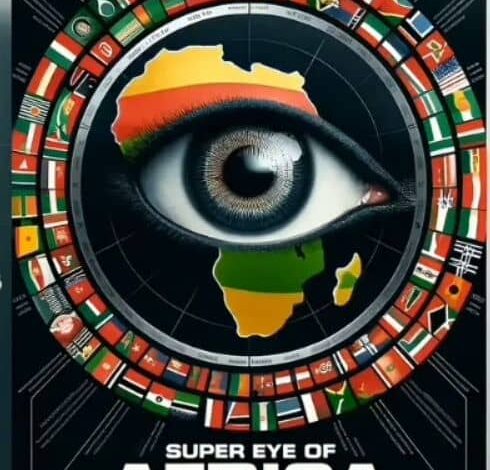Unmasking Néo-colonialism: Africa’s Struggle for True

Decades after achieving formal independence, Africa remains ensnared in the web of neo- colonialism—an insidious mechanism that wields control over economies, governments, and cultural identity. Despite the absence of colonial flags, imperial powers maintain dominance through policies and systems designed to exploit African nations. Neo-colonialism is the invisible hand that shapes trade agreements to favor foreign nations, entangles states in crippling debt cycles through conditional aid, and systematically drains the continent's wealth to fuel industrialized economies abroad.
This enduring exploitation has left Africa dependent and vulnerable, with sovereignty eroded by the influence of multinational corporations, foreign military bases, and manipulated governance. Beneath this surface lies a deeper cultural assault, as African traditions and narratives are overshadowed by Western ideologies and media, perpetuating cycles of alienation and inferiority. Neo-colonialism is not merely an extension of colonial rule—it is a modernized, systemic framework of domination that continues to undermine Africa's quest for true independence.
The Legacy of Pan-African Martyrs
Africa’s fight for self-determination is steeped in the blood and sacrifice of its visionary leaders who dared to envision a continent free from exploitation and dependency. Kwame Nkrumah, Ghana’s first president and a pioneer of Pan-Africanism, championed the idea of African unity as the backbone of true independence.
His relentless push for the creation of the Organization of African Unity (OAU) reflected his belief that only a united Africa could resist external domination. Yet, his removal in 1966, orchestrated amid external interference, marked a critical blow to the dream of African solidarity.
Muammar Gaddafi, the Libyan revolutionary leader, furthered this vision by advocating for the establishment of a united African government and a single continental currency. His financial support for liberation movements and role in strengthening the African Union solidified his place as a staunch defender of sovereignty. His violent ousting and assassination in 2011, during a NATO-led intervention, underscored the fatal cost of challenging the status quo of global power structures.
The list of martyrs is incomplete without Patrice Lumumba, whose unwavering demand for Congo’s authentic independence sealed his fate. Assassinated in 1961 with foreign complicity, Lumumba’s death sent a chilling message to Africa’s emerging leaders. Similarly, **Thomas Sankara, the revolutionary president of Burkina Faso, sought to eradicate neo-colonial dependencies through radical economic reforms and cultural pride. His assassination in 1987 during a coup signified the broader rejection of progressive African visions.
Other martyrs like Amílcar Cabral of Guinea-Bissau, who combined intellectual depth with military strategy, and Samora Machel, Mozambique’s first president, who steered his nation toward independence, serve as eternal reminders of the high cost of resisting neo-colonialism. Their sacrifices are a testament to the enduring struggle for African liberation and the fragility of the gains won.
Neo-Colonialism’s Negative Impact on Africa
While independence brought hope for self-governance, neo-colonialism has eroded the foundations of
progress. Key negative impacts include:
Economic Exploitation: Africa’s resources are extracted at low cost while foreign powers profit disproportionately. Trade agreements often favor industrialized nations, leaving African economies dependent and vulnerable.
Debt Dependency:
Foreign aid is frequently tied to conditions that hinder development, leaving nations trapped in cycles of debt and reliance. Political Interference: External powers manipulate African governance, supporting regimes that align with their interests while undermining democratic processes.
Cultural Erosion: The dominance of Western media and education systems alienates Africans from their
heritage, fostering a sense of inferiority and dependence on foreign narratives. Undermined Sovereignty: The presence of foreign military bases and interventions further compromises Africa’s ability to assert its independence.
The Rise of the Alliance of Sahel States (AES)
In the wake of centuries of exploitation and dependency, the Alliance of Sahel States (AES)—comprising
Burkina Faso, Mali, and Niger—has emerged as a bold response to imperialism and neo-colonial
domination. These nations, bound together by shared struggles and aspirations, have embarked on a
groundbreaking path to reclaim their sovereignty. Their formation signifies more than a regional
coalition; it is a profound assertion of Africa’s ability to dismantle external control and restore agency
over its destiny.
The AES’s rejection of military and economic agreements with former colonial powers like France
represents a seismic shift in Africa’s geopolitical landscape. By terminating accords that perpetuate
dependency, these nations have set a precedent for resisting imperialist influences. This collective
defiance is not merely symbolic—it is a structural reconfiguration of power relations, demanding the
dismantling of exploitative systems that have long hindered Africa’s progress.
Furthermore, the AES has prioritized grassroots mobilization, empowering local communities to take charge of their land, resources, and governance. Their coordinated efforts to combat jihadist forces have strengthened internal security while reducing reliance on external interventions that often come with hidden agendas.
This strategic self-reliance echoes the Pan-African spirit of unity, as the alliance seeks not only stability for its member states but also a model for liberation across the continent.
The AES’s rise is a testament to Africa’s resilience and its determination to break free from the vestiges of colonial control. Their actions underscore the potential of regional coalitions to challenge imperialist dominance, reclaim sovereignty, and inspire similar movements in other parts of Africa. As their influence grows, the AES stands as a beacon of hope in the long and arduous journey toward self-reliance and true independence.
A Call to Action
The rhapsody of neo-colonialism has lingered in Africa’s narrative for far too long, echoing across
generations through its economic, political, and cultural repercussions. The time has come to disrupt
this melody and replace it with a powerful symphony of sovereignty, unity, and progress. Africa cannot
afford to merely react to neo-colonial forces; it must proactively dismantle their foundations and chart a
bold course toward self-reliance and collective growth.
The pursuit of a common currency must stand at the forefront of this revolution, transcending colonial-era monetary dependencies and liberating Africa’s economies from the cyclical grip of foreign control. By establishing a unified currency, Africa can strengthen intra-continental trade, reduce its reliance on external financial institutions, and foster economic solidarity. This is not just an economic endeavor—it is a statement of independence and the foundation for a thriving, interconnected future.
Equally vital is the need for educational reforms that place African identity, history, and innovation at the core of learning. The current reliance on Western-centric curricula perpetuates mental colonization and alienates African youth from their heritage. A reimagined education system, one that champions African ingenuity and celebrates cultural pride, will equip the next generation with the tools to lead, create, and redefine Africa’s global position.
Africa must also champion policy reforms that prioritize local industries, value-added production, and sustainable development. The continent resources should no longer leave its shores unprocessed. Instead, they should fuel African economies, generate wealth, and empower communities. Coupled with political unity and robust regional coalitions like the Alliance of Sahel States, these reforms can serve as catalysts for transformation.
As Pan-African journalists, educators, policymakers, and citizens, the responsibility lies with us to amplify these efforts and inspire the collective will needed to break free from neo-colonialism. We must tell the untold stories, expose injustices, and advocate relentlessly for an Africa that defines its own destiny. This is the moment to honor the sacrifices of our martyrs, to confront the structures of oppression head-on, and to build a future rooted in pride, self-reliance, and unyielding hope.
Let the call to action resound across the continent: Africa must rise not as a patchwork of fragmented
nations, but as a unified force determined to reclaim its past, shape its present, and command its
future.
Source: Sir Alfred Kesse, (The Pan-African Child)





